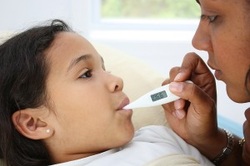
_
Seasonal Influenza: How Do I Protect
Myself and My Family? Influenza (flu) is a virus that infects the nose, throat,
windpipe and lungs. The virus is spread from one person to another by coughing
or sneezing or by touching contaminated surfaces and then touching one’s eyes,
nose or mouth.
People infected with influenza may be contagious one day before showing symptoms, and up to seven days after getting sick. Children may be contagious for even longer periods of time. Because it may be impossible to tell whether someone is infectious, it's important for people of all ages to protect themselves from it at all times.
Prevention tips
The best way to avoid getting influenza is to get the flu vaccine (nasal spray and injection are available…Your healthcare provider will determine which route is best for your child.) every year. It generates immunity specific to influenza. You can also minimize your children’s risks and yours of getting an illness spread by respiratory droplet, by teaching them to: Wash their hands often and thoroughly.
-Avoid close contact with people who are sick, and to stay home if they’re sick.
-Purchase child-friendly soaps that are designed to appeal to kids.
-Have them carry and use an alcohol-based hand sanitizer for times when they can't wash their hands.
-Sneeze or cough into their elbows instead of their hands if they don't have a tissue. Hands are more likely to spread germs.
-Avoid touching their face. The flu virus is often spread when a person touches something that’s contaminated with the virus and then touches his or her eyes, nose or mouth.
A recent study in the New England Journal of Medicine found that babies up to 6 months of age whose moms were vaccinated against influenza were less likely to be infected or hospitalized with influenza. That's important because infants less than 6 months old cannot get the influenza vaccine.
Reviewed by: Patrick S. Pasquariello Jr., MD Children’s Hospital of Philadelphia
People infected with influenza may be contagious one day before showing symptoms, and up to seven days after getting sick. Children may be contagious for even longer periods of time. Because it may be impossible to tell whether someone is infectious, it's important for people of all ages to protect themselves from it at all times.
Prevention tips
The best way to avoid getting influenza is to get the flu vaccine (nasal spray and injection are available…Your healthcare provider will determine which route is best for your child.) every year. It generates immunity specific to influenza. You can also minimize your children’s risks and yours of getting an illness spread by respiratory droplet, by teaching them to: Wash their hands often and thoroughly.
-Avoid close contact with people who are sick, and to stay home if they’re sick.
-Purchase child-friendly soaps that are designed to appeal to kids.
-Have them carry and use an alcohol-based hand sanitizer for times when they can't wash their hands.
-Sneeze or cough into their elbows instead of their hands if they don't have a tissue. Hands are more likely to spread germs.
-Avoid touching their face. The flu virus is often spread when a person touches something that’s contaminated with the virus and then touches his or her eyes, nose or mouth.
A recent study in the New England Journal of Medicine found that babies up to 6 months of age whose moms were vaccinated against influenza were less likely to be infected or hospitalized with influenza. That's important because infants less than 6 months old cannot get the influenza vaccine.
Reviewed by: Patrick S. Pasquariello Jr., MD Children’s Hospital of Philadelphia

